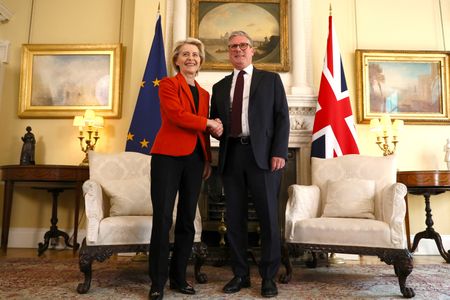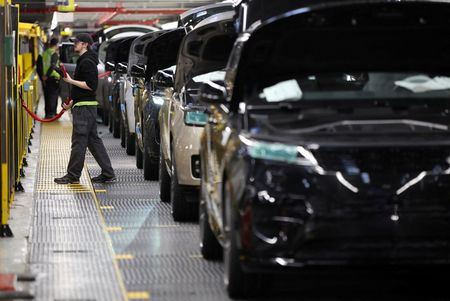By Andrew Gray and Andrew MacAskill
BRUSSELS/LONDON (Reuters) -Britain and the European Union have agreed to work towards a deal that would make it easier for young people to live and work across the continent as part of a wide-ranging reset of relations, according to a document seen by Reuters on Monday.
The so-called “balanced youth experience” scheme will allow young people from Britain and the 27-nation EU to work, study, volunteer, or travel for a limited period of time in each other’s countries, the document said.
“The European Commission and the United Kingdom should work towards a balanced youth experience scheme on terms to be mutually agreed,” the document said. “It should provide a dedicated visa path and ensure that the overall number of participants is acceptable to both sides.”
The plan is part of a wider reset of ties between Britain and the EU to be announced later on Monday, also covering trade, defence and other issues, in the most significant such move since Britain exited the bloc in 2020.
The announcement, expected to be included in a document published on Monday, comes only a week after British Prime Minister Keir Starmer pledged to tighten immigration rules to make it harder for newcomers to permanently stay in Britain.
Starmer’s government had until a few months ago rejected EU demands for a youth mobility deal, arguing it would be too close to restoring the free movement of people across the bloc that Britain ended with Brexit.
Polls show a majority of Britons now regret the 2016 referendum vote to leave the EU, though they do not want to rejoin, giving Starmer limited room for manoeuvre.
Nigel Farage, leader of Britain’s populist, right-wing Reform UK party, has said such a plan would “effectively be a back door to free movement” that was opposed by Britons who voted by a 52%-to-48% margin to quit the EU.
British officials have said that one of the main issues in any negotiation will be how to cap the number of EU students who will be allowed to come to Britain.
Since Britain’s referendum vote, the number of students and temporary workers coming from the EU has fallen. That has left hospitality businesses in Britain, such as restaurants, short of the workers they had previously relied on.
The document showed that Britain and the EU also intended to continue efforts to support the work of touring artists.
British professional musicians have said post-Brexit rules require them to obtain cultural performance visas and transport permits for their equipment, adding to the cost and complexity of securing work in the EU.
(Reporting by Andrew Gray and Andrew MacAskill, editing by William James, Sachin Ravikumar and Mark Heinrich)










